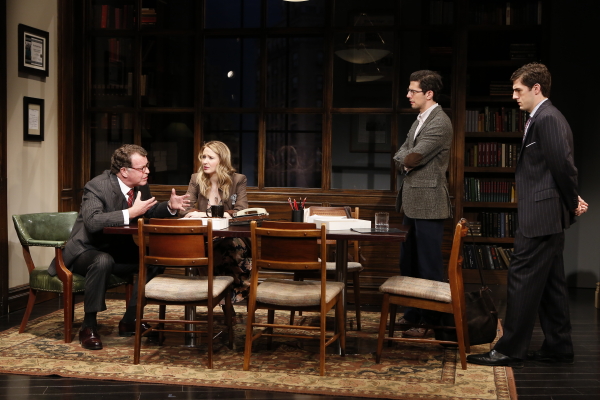The Substance of Fire

(© Carol Rosegg)
Jon Robin Baitz's The Substance of Fire seems like an unlikely candidate for revival. At first glance, it's like any other family drama that you might have seen in the last 25 years at Playwrights Horizons (where the show made its New York City debut in 1991). Baitz (Other Desert Cities) has a keen eye for generational drama, and this excellent revival at Second Stage Theatre is a testament to that. It's impossible not to see echoes of the present in this timeless tale.
The time is 1987: Isaac Geldhart (John Noble) is the president of Kreeger/Geldhart, a publishing house in New York City. His son, Aaron (Carter Hudson), is company's MBA-holding vice president. He desperately wants his dad to publish a new novel by hot young Bret Easton Ellis clone Val Chenard, believing it will give the company its first best seller in seven years. He has summoned his siblings, Sarah (Halley Feiffer) and Martin (Daniel Eric Gold), to New York to back him up. Isaac thinks the book is "meretricious bullsh*t" and would much rather publish titles like Hobson-Jobson: A Glossary of Colloquial Anglo-Indian Words & Phrases (which is a real book) and Louis Fuchold's six-volume study of the Nazi medical experiments. Having survived World War II in hiding, Isaac is obsessed with the Nazis. Aaron thinks his father's fixations and lack of business acumen will bankrupt the company. While Isaac controls 40 percent of the company stock, his three children own the remaining 60 percent. Can Aaron convince his siblings to give him a majority stake and seize control from his father? After all, dad is still dad.
The first act is set in the conference room of Kreeger/Geldhart. The Geldharts fight out their literary and financial differences in one long, very wordy scene. Under the deft direction of Trip Cullman, the cast easily navigates through a minefield of publishing-world arcana that could easily become boring and tedious, but never is. Every beat is specific and endowed with huge stakes: After this fateful meeting the family will either stay together or break apart.
Noble gives a sympathetic, fully fleshed performance as the aging Geldhart patriarch. He eviscerates his children with a bullying cultural arrogance: "You know your brother has his little Stanford-Wharton-Mafia flow charts he waves in my face and screams," he tells Sarah, sneering at Aaron's vulgar obsession with money. Isaac is clearly accustomed to being in charge, but his soft mittel-European accent grows increasingly growly as the play progresses. He's like a cornered bear, not afraid to draw blood in order to escape. Still, it's impossible not to take Isaac's side as Aaron questions his competence. Even if his tastes do not reflect the vast majority of American readers, Isaac is obviously sharp as a tack.
He finds a sympathetic shoulder in Marge Hackett (Charlayne Woodard), a social worker who arrives one frigid evening at his Gramercy Park apartment at the behest of Aaron. From her neatly braided hair to her crisp PBS correspondent diction, Woodard embodies the character, a woman well-traveled in the world of New York City government and bureaucracy. Marge and Isaac are from the same era and both find it difficult to see the kingdoms they built fall under the domain of new management.
As snow blankets the cityscape outside his massive windows (set design by Anna Louizos), Isaac must see that his reign as chief of the Geldhart clan has reached its winter. The lonely sound of banging pipes underscores his existence. Jill BC Du Boff also throws in some vintage WQXR to complete her subtle, incredibly realistic, and very effective sound design. Like a latter-day King Lear, Isaac is left to brood on his loss of power and lack of understanding of his children.
Viewed 24 years after its world premiere, The Substance of Fire feels surprisingly prescient. We now live in an America run largely by people of Aaron's generation and business-school pedigree. Has a laser-beam focus on bottom lines and stock price served our society well in the last three decades? Isaac's voice, tyrannical though it may be, comes into the space like a breath of fresh air. Taken in the context of 2014, this old patriarch feels like a young radical.










